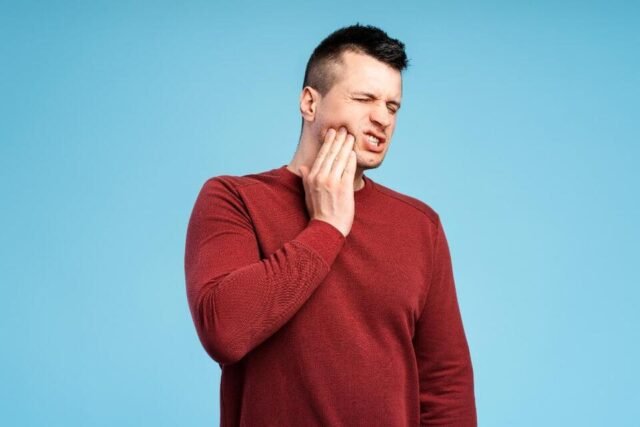Temporomandibular Disorder (TMD) exists as a joint condition affecting the connection between the jawbone and skull through the temporomandibular joint (TMJ). The condition results in major pain symptoms and stiffness. This makes your normal daily activities such as eating and speaking challenging to perform. TMD affects between 5 and 12 percent of the population, as reported by the National Institute of Dental and Craniofacial Research. People who suffer from TMD pain can find relief through both personal treatment methods and clinical therapies for supervision. The blog will provide Houston residents with research-based TMD pain treatment and management solutions.
Understanding TMD: Causes and Symptoms

Common Causes of TMD
TMD can be caused by a variety of factors, including bruxism (teeth grinding), arthritis, jaw injuries, and tooth position issues, as well as stress and poor body posture.
- The increased pressure caused by bruxism causes jaw muscle and joint strain.
- The most common causes of TMJ degeneration are osteoarthritis and rheumatoid arthritis.
- Accidents and physical trauma to the jaw can cause long-term dysfunction of the affected joints.
- Malocclusion causes higher stress on the TMJ because it disrupts appropriate jaw alignment, causing symptoms to develop over time.
- Anxiety-induced stress causes people to clench their jaws instinctively, resulting in muscle weariness and facial pain.
Risk Factors That Increase TMD Susceptibility
There are specific situations that encourage the development of TMD. Women are more susceptible to TMD due to hormonal changes that affect muscle function and joint responsiveness. People with a history of jaw injuries, as well as those who grind their teeth on a daily basis, are more likely to acquire TMD. Bad dental alignment, when combined with continuously stressed muscles that eventually stiffen up, can cause TMD.
Recognizing TMD Symptoms
A patient with TMD shows typical signs of jaw discomfort, which intensifies during eating and speaking. Opening and closing your mouth leads various individuals to hear sounds such as jaw clicks, pops, and grinding. The condition sometimes leads to restricted jaw motion or the development of lockjaw, which makes tasks like eating and speaking uncomfortable.
Ear pain, ear pressure, and repeated headaches as well as facial pain that focuses on the temple areas represent other symptoms of TMD. Managing wide-mouth motions is not comfortable for people suffering from TMD.
At-Home Remedies for Managing TMD Pain in Houston
Managing TMD pain at home involves several effective strategies that Houston residents can adopt. Given the city’s humid climate, swelling and inflammation can feel worse in the heat. Applying a cold compress for 10-15 minutes can help reduce inflammation and numb acute pain, while heat therapy, using a warm towel, relaxes tense jaw muscles.
Jaw Exercises and Relaxation Techniques
Performing gentle jaw exercises and stretches can enhance mobility. Houston’s dental service providers often recommend resisted mouth-opening exercises, where light pressure is applied under the chin while opening the mouth slowly. Relaxation techniques such as controlled breathing or meditation are commonly practiced and can alleviate muscle tension and reduce clenching.
Dietary Adjustments to Reduce Jaw Strain
According to the National Library of Medicine, following a special diet constitutes a fundamental element for managing TMD. Houston provides numerous soft food choices including mashed potatoes along with soups and blended smoothies that people can easily find at health-conscious destinations and juice bars. Chewy foods should be restricted due to their potential to strain the jaw area.
Stress Management and Massage Therapy
Stress is a vital factor in the development of TMD symptoms for Houston residents who benefit from accessing local stress management solutions that include yoga studios and massage therapy clinics. Massaging the jaw with Houston-based physical therapist-instructed procedures can enhance blood circulation and tension relief in the affected area.
Professional TMD Treatment Options in Houston

For those who do not experience sufficient relief from at-home TMD treatments, seeking professional intervention in Houston is highly recommended. The city has a wide range of specialists, including dentists, physical therapists, and pain management doctors, who offer advanced TMD treatments.
Dental Appliances for TMD Relief
Custom dental appliances play a crucial role in managing TMD symptoms by reducing strain on the jaw joint and preventing harmful behaviors like teeth grinding and clenching. Occlusal splints, also known as night guards, are custom-fitted mouthguards designed to prevent excessive jaw movement during sleep, thereby reducing stress on the TMJ. Houston dental clinics facilitate these appliances tailored to an individual’s bite to ensure optimal comfort and effectiveness.
Medication and Injectable Treatments
After a thorough consultation, Houston-based dentists may also recommend visiting pain specialists to get medications such as muscle relaxants or corticosteroid injections to reduce inflammation. Botox injections, available at several dental and pain management clinics in Houston, can relax overactive jaw muscles and provide long-term relief.
Surgical and Minimally Invasive Procedures
Minimally invasive procedures such as arthrocentesis are used to flush out joint inflammation. TMJ surgery is reserved for severe cases and is conducted by experienced maxillofacial surgeons in Houston’s top-rated hospitals. TMJ arthroscopy and modified condylotomy are also effective procedures to relieve pain and reduce the locking of jaw joints.
Conclusion
Proper TMD pain management requires combining self-care with professional help to control its impact on daily life. Local residents in Houston have multiple treatment choices, like physical therapy, dental treatments, and cutting-edge medical solutions. The first step for TMD diagnosis and long-term relief is to consult with a Houston dentist.






















